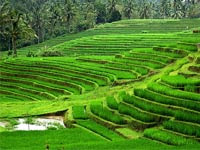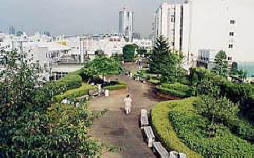Subak: The Balinese Way to Save the Environment
Bali is famous because of it's beautiful art, music, dance, culture, temple, people and the tradition. 
Subak is one of the Balinese unique ancient traditions. In the conservationist's view, Bali's Subak as an iconic symbol of the life of the Island's people needs to elevated. From the Subak system the Balinese learn organizational skills, environmental preservation and study democratic processes.

To understand the cooperative Subak organization some general information about Balinese values and social organization is essential fist. The Balinese are a race united through cultural organizations, strengthened by shared customs, religion and language. Their culture also varies from one district to another in accordance with the three factors of place, time and situation.

The values system of Balinese is in accordance with the teaching of the Hindu religion, bound by the law of Karma and the philosophy called Tri Hita Karana. This law maintains that there are three elements in the quest for happiness and that there must be a balance between the three: Almighty Good, humanity and God’s creation-this world which is the habitat of mankind.
The Subak has a certain laws or rules which regulate the mutual livelihoods of its members. These are based on the Tri Hita Karana philosophy outlined above. If anyone breaks these rules traditional and religious sanctions are invoked. The sanctions against anyone breaking the rules are intended to restore harmony between the material and spirit worlds. An offender can be made democratically by the majority.

Neighbouring ASEAN countries and China have rice fields that have become tourism objects. But the rice terraces of Bali, operated under the Subak, have proven their ability to attract foreign tourists from as far away as Zimbabwe who have travelled to the island to study and understand the Bali water distribution system.
In other to preserve and increase humanity’s well being, the Balinese try to maintain a balance between these three elements: being conscious that humanity is God’s creation and that the natural environment provides a living hood and is a blessing from God, mankind must conserve the environment and thank God for all the benefit of creation and the gift of wellbeing.

These beliefs form the basic of social interaction amongst the Balinese and encourage them to preserve and care for the whole ecological system. Belief in the law of Karma is another form of control so that people restrain themselves from doing evil and try to do good both as individuals and as member of their community.
These ideas and values have given birth to a way of behaving and customs which have been handed down from generation to generation in Bali. Consequently certain traditional organizations have emerged as social units such as the village (Desa), the neighbourhood (banjar) and the irrigation society (Subak).

The Subak is an independent organization aimed to ensure that the distribution of water is made equitably. No farm must be given more or less than their fair share. The equal distribution of water is not done through modern equipment but can be arranged because of the spirit of solidarity and a high level of tolerance and mutual responsibility, despite there being only very simple means to share out the water. The spirit of cooperation (gotong royong) is clearly done in this traditional irrigation system.
The existence of the Subak, although it is a traditional form of organization, is and will remain relevant in Bali. This is because of the high degree of cooperation which exists amongst its members, and because all feel comfortable and fair.

Now, should you wish to know further about the uniqueness of this Subak organization in Bali, you can peruse it through the books available in the Subak Museum. Recently, only few visitors indeed want to read the books about the Subak provided in the museum, where as they could give more complete information on the existence and uniqueness of Subak in Bali.
If you go to Bali you will see Balinese rice fields are beautiful and the environment green and peaceful. To learn more about the Subak, please visit Subak Museum in Bali. This Subak Museum is located in Tabanan Regency, precisely on Jalan Kediri—Tabanan or 20 km west of Denpasar city. It is within close range of Alas Kedaton monkey forest and magnificent Tanah Lot Temple.

Subak is one of the Balinese unique ancient traditions. In the conservationist's view, Bali's Subak as an iconic symbol of the life of the Island's people needs to elevated. From the Subak system the Balinese learn organizational skills, environmental preservation and study democratic processes.

To understand the cooperative Subak organization some general information about Balinese values and social organization is essential fist. The Balinese are a race united through cultural organizations, strengthened by shared customs, religion and language. Their culture also varies from one district to another in accordance with the three factors of place, time and situation.

The values system of Balinese is in accordance with the teaching of the Hindu religion, bound by the law of Karma and the philosophy called Tri Hita Karana. This law maintains that there are three elements in the quest for happiness and that there must be a balance between the three: Almighty Good, humanity and God’s creation-this world which is the habitat of mankind.
The Subak has a certain laws or rules which regulate the mutual livelihoods of its members. These are based on the Tri Hita Karana philosophy outlined above. If anyone breaks these rules traditional and religious sanctions are invoked. The sanctions against anyone breaking the rules are intended to restore harmony between the material and spirit worlds. An offender can be made democratically by the majority.

Neighbouring ASEAN countries and China have rice fields that have become tourism objects. But the rice terraces of Bali, operated under the Subak, have proven their ability to attract foreign tourists from as far away as Zimbabwe who have travelled to the island to study and understand the Bali water distribution system.
In other to preserve and increase humanity’s well being, the Balinese try to maintain a balance between these three elements: being conscious that humanity is God’s creation and that the natural environment provides a living hood and is a blessing from God, mankind must conserve the environment and thank God for all the benefit of creation and the gift of wellbeing.

These beliefs form the basic of social interaction amongst the Balinese and encourage them to preserve and care for the whole ecological system. Belief in the law of Karma is another form of control so that people restrain themselves from doing evil and try to do good both as individuals and as member of their community.
These ideas and values have given birth to a way of behaving and customs which have been handed down from generation to generation in Bali. Consequently certain traditional organizations have emerged as social units such as the village (Desa), the neighbourhood (banjar) and the irrigation society (Subak).

The Subak is an independent organization aimed to ensure that the distribution of water is made equitably. No farm must be given more or less than their fair share. The equal distribution of water is not done through modern equipment but can be arranged because of the spirit of solidarity and a high level of tolerance and mutual responsibility, despite there being only very simple means to share out the water. The spirit of cooperation (gotong royong) is clearly done in this traditional irrigation system.
The existence of the Subak, although it is a traditional form of organization, is and will remain relevant in Bali. This is because of the high degree of cooperation which exists amongst its members, and because all feel comfortable and fair.

Now, should you wish to know further about the uniqueness of this Subak organization in Bali, you can peruse it through the books available in the Subak Museum. Recently, only few visitors indeed want to read the books about the Subak provided in the museum, where as they could give more complete information on the existence and uniqueness of Subak in Bali.

If you go to Bali you will see Balinese rice fields are beautiful and the environment green and peaceful. To learn more about the Subak, please visit Subak Museum in Bali. This Subak Museum is located in Tabanan Regency, precisely on Jalan Kediri—Tabanan or 20 km west of Denpasar city. It is within close range of Alas Kedaton monkey forest and magnificent Tanah Lot Temple.


Comments